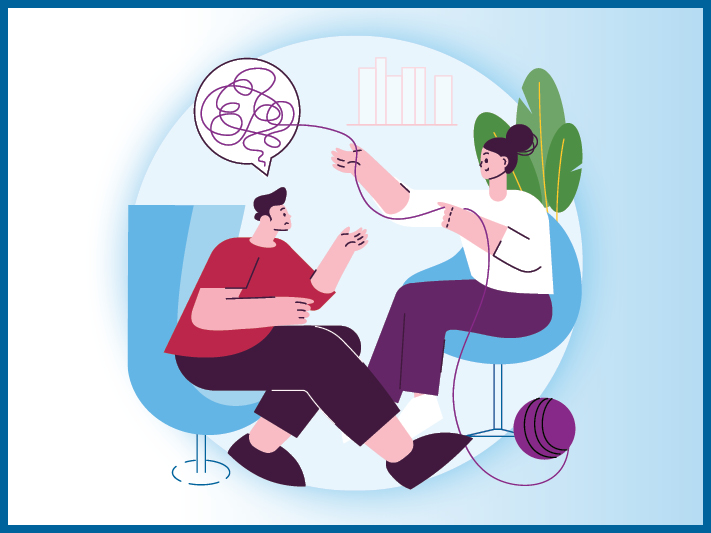The Benefits of Cognitive Behavioral Therapy

“Wellness” looks different for everyone. Staying active, eating well, feeling calm, and building meaningful connections are all ways of living your best, and they all begin with your brain. While the journey toward wellness starts in our minds, it can get stuck there, too. Intrusive thoughts, anxiety, and stress can derail your physical and mental health, but cognitive behavioral therapy can help.
Cognitive behavioral therapy (CBT) is a type of psychotherapy that focuses on the idea that what we think, feel, and do are interconnected. By examining the cause and effect of our thoughts on our feelings and behaviors, CBT can empower us with strategies to cope with challenges, regulate emotions, and manage stress.
What Is Cognitive Behavioral Therapy?
Pioneered by American psychiatrist Dr. Aaron T. Beck in the 1960s, cognitive behavioral therapy was developed as a more collaborative, pragmatic form of therapy in which the practitioner and the patient work together to find solutions that make an immediate impact on symptoms. Working with a trained therapist, CBT involves learning to identify and challenge harmful thought patterns before they turn into destructive feelings and behaviors.
CBT is a structured, goal-oriented talk therapy that can be a beneficial tool on its own or combined with medication as part of a person’s holistic mental health treatment plan. In contrast to other forms of psychotherapy, like more traditional Freudian psychoanalysis, CBT is focused on problem-solving for a patient’s present and future. Although it doesn’t totally disregard how a person’s past may have shaped them, you won’t necessarily be delving into your childhood or relationship with your mother.
During your session, your therapist will get to know you and your goals for your treatment. It’s not uncommon for therapists to give their patients “homework” in the form of journals and worksheets for them to keep track of their thoughts and feelings between sessions.
What Are Cognitive Distortions, and How Can CBT Help?

Many people get trapped in a spiral of endless, toxic thinking. It’s easy to start building out a single anxiety into an entire world of worry. Maybe your friend didn’t text you back, and you start thinking they must be mad at you. Maybe you didn’t get the feedback you expected at work, and you start believing you’re bad at your job. These are cognitive distortions: inaccurate or warped ways of thinking that affect our lives and the way we interact with the world.
Even though cognitive distortions start out as mere thoughts, if left unchecked, they have compounding effects on your physical and mental health and can lead to withdrawing from social situations, missing out on opportunities, or self-harm. Cognitive behavioral therapy can help by first teaching you to recognize when cognitive distortions are happening, what specific events trigger them, and how they make you feel. Then, together with a therapist, you’ll work on developing the skills to dismantle those distortions and rebuild positive patterns. Psych Central refers to this as “cognitive restructuring.”
What Can CBT Improve in Your Life?
Since the first major clinical trial in 1977, cognitive behavioral therapy has proven itself as or more effective than pharmaceutical treatment alone for patients with mild to moderate depression. CBT has also been shown to improve emotional regulation, as well as treat stress management, and the Mayo Clinic lists phobias, post-traumatic stress disorder (PTSD), anxiety, and eating disorders as just a few of the other mental health disorders that may improve with CBT treatment.
Most of all, cognitive behavioral therapy empowers you to understand and regulate your state of mind more effectively. CBT helps you develop individualized strategies to manage stress, anger, sadness, and other emotions in a constructive way—so you can start feeling better today and respond with resilience when faced with adversity tomorrow.
If you’re interested in learning more about how the human mind works and the ways you can help it work better, you can start with a psychology degree. After all, education can be a form of self-care!



